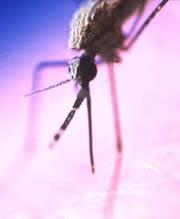 Mosquitoes engineered to kill off the parasite that causes malaria seem to live long and prosper.WHO
Mosquitoes engineered to kill off the parasite that causes malaria seem to live long and prosper.WHOMosquitoes engineered to not transmit malaria fare better than their unaltered siblings, according to new research. The work rekindles hope that transgenic mosquitoes could one day be used to wipe out natural insects in the wild, helping to control the spread of malaria.
A team from the Bloomberg School of Public Health and the Malaria Research Institute at Johns Hopkins University in Baltimore, Maryland, let caged wild-type and transgenic mosquitoes dine on mice that had been infected with malaria. Not only did the altered mosquitoes not become infected by the parasite, but over time they outnumbered their normal siblings, the researchers report in Proceedings of the National Academy of Sciences1. The population of malaria-resistant mosquitoes grew because they produced more eggs and were less likely to die.
When transgenic and non-transgenic mosquitoes were fed non-infected blood, their numbers remained approximately equal.
"What this study shows is that the transgenic mosquitoes do have an advantage," says team leader Marcelo Jacobs-Lorena.
"This paper is the experimental proof we needed," says Andrea Crisanti of Imperial College in London. "This is good news."
Fitness fad
For some time, researchers have been trying to create transgenic mosquitoes that are somehow resistant to the Plasmodium parasite that causes malaria, making it impossible for the insects to spread the disease. But whether the transgenic insects would be able to out-compete their normal mates and spread their genes, or whether they would simply die out soon after being released has remained a mystery.
A 2003 study by Crisanti and colleagues suggested that at least one type of transgenic mosquito was less fit than normal ones2, temporarily dashing hopes that the designer mosquitoes could be used to fight malaria. But Crisanti did not use malaria-resistance genes in his study.
In 2006, researchers found that many mosquitoes are in fact naturally resistant to the parasite, boosting hopes that there wasn't an insurmountable cost to being resistant3.
The new study looks at mosquitoes intentionally modified to beat back the malaria parasite, and found much more encouraging results than the 2003 work. But "it does not solve all of the problems," says Jacobs-Lorena. Most researchers think that for the gene to spread effectively during mating, another technique would need to be used to encourage transfer — such as adding a genetic element called a transposon to the genome, or dosing mosquitoes with bacteria called Wolbachia, which encourages the selective survival of offspring infected with the bacterium. These extra elements could affect the survival of the transgenic insects in as-yet-unknown ways, he says.
"An individual mosquito can be transformed in the lab, but now the challenge is to transform an entire population," says Crisanti.
Control measures
Others worry that intentionally trying to replace a natural population with a genetically altered one could have a whole host of unintended consequences on the environment.
</p><p>
ADVERTISEMENT
The designer mosquito was constructed from Anopheles stephensi, a mosquito that spreads malaria in Asia, and a synthetic gene for a peptide called SM1. The genetically modified mosquitoes killed off Plasmodium berghei that they ingested — the parasite responsible for the mouse version of malaria. The ultimate target would be to manipulate the genome of A. gambiae, the mosquito most responsible for malaria worldwide, to be resistant against one or more of the four parasites that infect humans.
The strategy is one of many tools that researchers are working on to fight malaria. Other ideas include creating transgenic mosquitoes with altered immune systems, shielding mosquitoes against the bug by vaccinating humans and waiting for the pests to drink up the antibodies, or immunizing humans against the disease. Bed-nets and insect sprays are also still crucial to malaria control programmes.
Visit our mosquitoesprove_e.html">newsblog to read and post comments about this story.
-
References
- Marrelli M. T., Li C., Rasgon J. L. & Jacobs-Lorena M. Proc. Natl Acad. Sci. USA, 104 . 5580 - 5583 (2007).
- Catteruccia F., Godray H. C. & Crisanti A. Science, 299 . 1225 - 1227 (2003). | Article | PubMed | ISI | ChemPort |
- Riehle M. M., et al. Science, 312. 577 - 579 (2006). | Article | PubMed | ChemPort |
